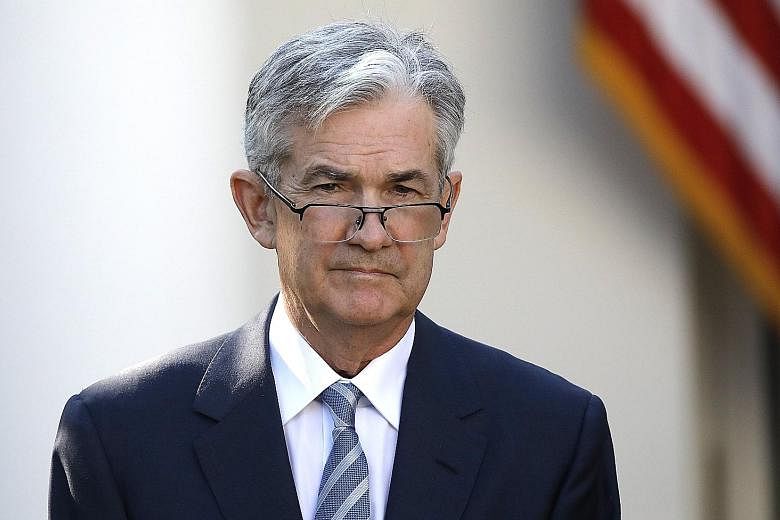WASHINGTON • Mr Jerome Powell was not on President Donald Trump's early radar as a possible successor to Federal Reserve chair Janet Yellen and was angling instead for a job as the US central bank's vice-chair for supervision.
But when he was passed over for that position last summer, it was one in a chain of events that left the Fed governor and investment banker on the cusp of taking over as head of the world's most powerful central bank.
President Trump on Thursday nominated Mr Powell, 64, to replace Dr Yellen when her term expires in early February.
Other contenders fell for different reasons, as Mr Trump soured on top White House economic adviser Gary Cohn, decided against re-appointing Dr Yellen despite largely approving of her policies, and came to view two others as posing risks to the economy.
In the end, it was Mr Powell, a Maryland native, avid cyclist and guitar hobbyist, who checked all the boxes that mattered but carried none of the negatives. If confirmed by the US Senate, Mr Powell would become the first person without an advanced economics degree to hold the job since Mr William Miller in the late 1970s.
A lawyer who lists personal assets of between US$20 million (S$27.2 million) and US$60 million on government disclosure forms, Mr Powell has worked in investment banking and served on corporate boards as a managing partner at the Carlyle Group, a private equity firm.
But he has also burrowed deep over the last five years into the nuts and bolts of central banking, and schooled himself on broader monetary policy issues.
When compared to other possible nominees, some of whom called for sweeping but ill-defined changes at the Fed, Mr Powell took "a straight tactical line" that offered a continuation of Dr Yellen's policies, a moderate approach to bank regulation and, perhaps most importantly, the prospect of no surprises, said Mr Steve Bell, who worked with him at the Bipartisan Policy Centre think-tank and when Mr Powell was at the Treasury Department in former president George H.W. Bush's administration.
Mr Powell's private-sector experience likely appealed to Mr Trump's preference for business figures over those with PhDs. "He is not a guy who has a rule named after him. He is not a guy who has said in the past we'll have a bad reaction to quantitative easing and it is a disaster," Mr Bell said in a reference to Stanford University economist John Taylor and former Fed governor Kevin Warsh.
Professor Taylor, who developed the "Taylor Rule" for guiding monetary policy, and Mr Warsh, who resigned over the Fed's massive bond-buying stimulus programme which many now credit with spurring the US economy after the 2007 to 2009 recession, were interviewed for the Fed job. They arguably had a head start, the backing of conservatives, and steady support from The Wall Street Journal's influential editorial board. But they also carried the risk of financial market volatility, with investors regarding each as somebody who could tighten monetary policy at the central bank. That is something Mr Trump has indicated he wants to avoid.
A former Fed official, contacted over the summer as part of the White House's Fed chief search, said it was clear the administration was not interested, for example, in Prof Taylor and his reliance on "rules" that generally call for interest rates to be higher than they currently are. Mr Warsh, meanwhile, became the target of an aggressive grassroots campaign that highlighted what some critics viewed as a history of bad calls on inflation during his tenure as a Fed policymaker.
But it was Mr Powell's support of Dr Yellen's Fed policies, often credited with paving the way for a 4.2 per cent unemployment rate, steady economic growth and calm markets, that may have been his strongest advantage.
"Trump is savvy enough to look at the numbers and who is in the chair," said Assistant Professor Peter Conti-Brown at The Wharton School of the University of Pennsylvania. Mr Powell solves the problem of a Republican administration that wants "the Yellen Fed without Yellen," he said.
REUTERS

